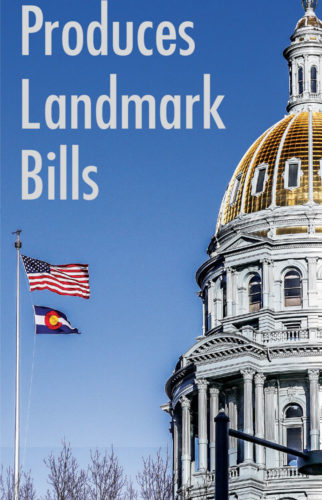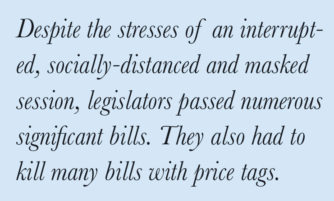

One of the most extraordinary—and short—sessions of the Colorado General Assembly ended June 15 after lawmakers pushed out a stack of notable legislation.
Despite the stresses of an interrupted, socially-distanced and masked session, legislators passed bills to:
- Set new standards for police conduct (SB 20-217)
- Repeal the state’s death penalty (SB 20-100)
- Create collective bargaining rights for state employees (HB 20-1153)
- Increase benefits and make other changes to unemployment insurance (SB 20-207)
- Require employers (with some exceptions) to provide paid sick leave for employees (SB 20-205)
- Start setting up a state-run retirement savings plan (SB 20-200)
- Restructure and refinance the state’s reinsurance program, which is intended to help control medical insurance costs (SB 20-215)
- Set up more uniform procedures for requesting exemptions from school enrollment immunization requirements (SB 20-163)
Most important, lawmakers managed to patch together a $31.7 billion 2020-21 state budget, but only by making significant cuts to K-12 support and higher education. And the legislature set in motion four tax policy changes that could be significant in the future. Those include:
- A measure to exempt Colorado’s tax code from recent federal tax cuts, thereby raising revenue needed to balance the budget (HB 20-1420)
- The proposal to voters for repeal of the Gallagher Amendment; doing so would ease the distortions in the current property tax system (SCR 20-001)
- Another referendum to voters, this one to raise taxes on nicotine products (HB 20-1427)
- A change in school district finance law that could allow future legislatures to raise property taxes (HB 20-1218)
 The legislature also passed an 11-bill COVID-19 relief package financed with $70 million in emergency federal funding. The bills are designed to provide aid to small businesses, renters and people who need help with utility bills, among other things.
The legislature also passed an 11-bill COVID-19 relief package financed with $70 million in emergency federal funding. The bills are designed to provide aid to small businesses, renters and people who need help with utility bills, among other things.
All but the death penalty repeal were passed during the legislature’s truncated 15-day “second” session.
Jan. 8—Things Started Normally
The official legislative journals will record it only as the “Second Regular Session of the 72nd General Assembly,” but the truth is that the Colorado legislature had two regular sessions this year.
The first ran from Wednesday, Jan. 8 to Saturday, March 14, with no work done on weekends and holidays. It was pretty much like the first couple months of any legislative session.
There were concerns that there wouldn’t be enough state revenue to support new spending proposed by interim committees and Gov. Jared Polis’ plan to expand the state preschool program.
There was lots of chatter about whether majority Democrats would be able to complete 2019’s unfinished business on big dreams like paid family leave and public option health insurance.
Bills were introduced, committees held hearings, routine work was done during floor sessions, bills were negotiated behind the scenes, news releases were issued and the Joint Budget Committee labored to make mid-year tweaks to the 2019-20 budget and to build the 2020-21 budget, line item by line item.
There was little sense of urgency—there never is in the first half of any 120-day legislative session. But the first session did see passage and signing of some notable bills in addition to the death penalty repeal, including:
- HB 20-1031, replacing Columbus Day with an observance honoring Mother Cabrini
- HB 20-1048, banning workplace discrimination based on hair styles
- SB 20-014, allowing students to take excused absences for mental health concerns
- SB 20-123, removing bans on compensation for college athletes
Mar. 9—Things Started Changing
The mood at the Capitol started to change as the Covid-19 pandemic began to dominate the news. By Saturday, March 14, legislative leaders had decided to recess because of the growing health threat. It was only the 67th day of the 120-day session.
One key parting action taken by lawmakers was to formally ask the Colorado Supreme Court if the mandated 120-day session needed to be consecutive, as has always been the case. A never-used legislative rule held that session days did not need to be consecutive during a declared state health emergency, but lawmakers wanted a ruling.
Later in March, the court ruled for non-consecutive days, giving lawmakers some breathing room beyond what would have been the scheduled adjournment date of May 6.
State Budget Deadline Looms
But lawmakers faced another, firmer deadline—the end of the fiscal year on June 30, the last date on which a new state budget could could go into effect. In practical terms the budget needed to be adopted in early June so school districts could set their own budgets based on the amount of state aid.
After a lot of phone calls, Zoom meetings and fits and starts, lawmakers decided they needed to reconvene in mid-May.
The Joint Budget Committee went back to work on May 4, starting to cut the almost-finished budget it had left behind in March. And then it had to slash even more after updated revenue forecasts on May 12 revealed the depth of state revenue losses. The process took longer than expected.
May 26—Reconvening
The Capitol was very different from the one lawmakers had left in March. Visitor temperatures were checked at the entrance, clear plastic panels separated legislator desks, some lawmakers sat in the galleries and a few participated remotely from home. Lobbyists and citizens were thin on the ground. Most everybody wore masks—except for some Republicans.
Once lawmakers got settled, the Democratic majority moved quickly. Of the 651 bills brought during the entire session, 66 were introduced during the brief second session, and they included the biggest bills of the session.
The Republican minority objected to the speed with which major proposals were introduced and moved, and they even used parliamentary delaying techniques a few times. The Democratic juggernaut kept moving, although there were significant concessions on some bills, such as the Fair Tax Bill, HB 20-1420. The Police Accountability Bill gained strong bipartisan support after a series of amendments were added, and there was even a little compromise on the immunizations bill.
Killing Bills
Lawmakers’ other job during the second session was to kill bills.
The revenue situation made it impossible to fund most proposals with price tags, including several bills proposed by 2019 legislative study committees on early childhood education, school safety and substance abuse.
And legislative leaders, determined to spend as few days as possible in the Capitol during the pandemic, jettisoned other bills they deemed unimportant, unlikely to pass or too controversial or complicated to pass quickly.
Efforts to eliminate the statute of limitations on some sex crimes, set eviction protections, require greater state oversight of RTD, approve bail reform and pretrial release and require safe firearms storage all failed, as did some environmental bills.
All in all, some 316 bills either were postponed indefinitely (which requires individual votes) or just allowed to die in committee or on the floor calendar after lawmakers went home.
Democratic plans to pass a broad family leave bill and provide lower-cost health insurance, along with the governor’s preschool funding dreams, never got off the ground.
Lawmakers adjourned on Monday, June 15, the 84th day of the session, not using all the flexibility the Supreme Court gave them.
Looking Ahead
Most observers expect that the 2021 session will face even harder budget decisions, given that recession effects usually last for two or three years and that most of the transfers and other tricks used to balance the 2020-21 budget won’t be available next year.
And there will be a lot of new faces when the legislature convenes next year. Nine senators and 13 representatives won’t be returning because of term limits or because they’re not running again. Democratic House Speaker KC Becker of Boulder is among the term-limited. Democratic Senate President Leroy Garcia is in the middle of his term.
Todd Engdahl owns Capitol Editorial Services, a firm that provides legislative coverage, intelligence and analysis to private clients. During a long career as an editor and public policy journalist, he served as executive city editor of The Denver Post, founder of DenverPost.com and a founder of Education News Colorado, which later became part of Chalkbeat Colorado.



0 Comments